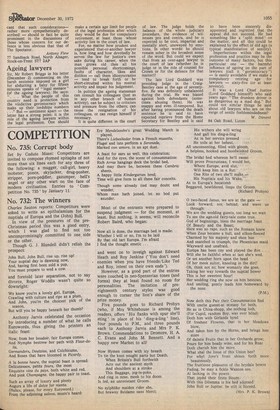Ageing lawyers
Sir, Mr Robert Briggs in his letter (December 2) commenting on the harsh sentence imposed on a girl for abducting a baby for fifteen minutes speaks of "legal menace" (of the ageing lawyers). He says: " . . What the people of this country need is protection from the vindictive gerontocracy which make up their lordships numbers . . ." But — sentiment apart — the letter has a strong point: it is the role of the ageing lawyers within the legal profession. One should
make a certain age limit for people of the legal profession after which they would be due for compulsory retirement, at least those whose activity lies in the court of law.
For, no matter how prudent and experienced that-or-another lawyer is, how long and how devotedly he serves the law for justice's own sake during his career, when the man grows old then all his possible personal shortcomings, faults of character, likes and dislikes — call them idiosyncrasies — tend to break forth or be short-circuited within his mental activity and impair his judgement.
In politics the ageing statesman can consult his colleagues (just as in any other branch of human activity), can be subject to criticism and pressure from the others; can cause the resignation of his colleagues, or can resign himself if necessary.
It is quite different in the court of law. The judge holds the balance of the whole judiciary procedure, the evidence of witnesses pro and contra, and he is expected to be cool, impartial and mentally alert, unswayed by emotions. In other words: he should remain sober in the broadest sense of the word. But could we expect that from an over-aged lawyer in the court of law (whether he is judge or in the role of counsel for Crown or for the defence for that matter)?
The late Lord Goddard was presiding judge in the CraigBentley case at the age of seventyfive. He was definitely unbalanced during the trial. He was biased against both defendants (sometimes abusing them). He was snappy and even ill-tempered. But after having pronounced the death sentence he is said to have expected reprieve from the Home Secretary for Bentley and is said
to have been sincerely disappointed and regretted that the appeal did not succeed. He had something like a 'split mind ' on the matter, and all this could be explained by the effect of old age (a typical manifestation of senility). Imperfections within the legal profession and practice may be the outcome of many factors, but this particular one — the harmful influence of ageing on the part of lawyers (call it " gerontocracy ") — is easily avoidable if we make a compulsory retiring age for lawyers — sixty-five (or at least seventy). It was a Lord Chief Justice (Lord Goddard himself!) who said years ago: "The drunken driver is as dangerous as a mad dog." But could not similar things be said about old lawyers who are on the verge of senile feeblemindedness?
W. Diment 84 Oak Road, Luton


































 Previous page
Previous page